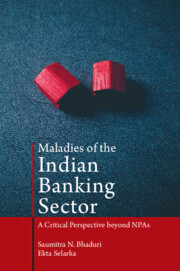Book contents
- Frontmatter
- Dedication
- Contents
- List of Figures
- List of Tables
- Foreword
- Acknowledgements
- 1 Prologue
- 2 The Indian Banking Sector: A Brief History
- 3 The Index of Credit Allocative Efficiency
- 4 Macroeconomic Analyses of Bank Credit Misallocation in the Indian Corporate Sector: Investigation of Pro-cyclicality
- 5 Determinants of Bank Credit Misallocation: Firm-level Analysis
- 6 Allocative Efficiency of Bank Credit and Firm Performance
- 7 Credit Reallocation by Indian Banks in the Aftermath of the Global Financial Crisis
- 8 The Zombie Story: Credit Boom and the Rise of Zombie Firms in the Indian Economy
- 9 Epilogue
- Bibliography
- Index
4 - Macroeconomic Analyses of Bank Credit Misallocation in the Indian Corporate Sector: Investigation of Pro-cyclicality
Published online by Cambridge University Press: 27 September 2022
- Frontmatter
- Dedication
- Contents
- List of Figures
- List of Tables
- Foreword
- Acknowledgements
- 1 Prologue
- 2 The Indian Banking Sector: A Brief History
- 3 The Index of Credit Allocative Efficiency
- 4 Macroeconomic Analyses of Bank Credit Misallocation in the Indian Corporate Sector: Investigation of Pro-cyclicality
- 5 Determinants of Bank Credit Misallocation: Firm-level Analysis
- 6 Allocative Efficiency of Bank Credit and Firm Performance
- 7 Credit Reallocation by Indian Banks in the Aftermath of the Global Financial Crisis
- 8 The Zombie Story: Credit Boom and the Rise of Zombie Firms in the Indian Economy
- 9 Epilogue
- Bibliography
- Index
Summary
Pro-cyclicality in the lending behaviour and misallocation of resources by financial institutions has been a contentious issue in economic literature for a long time. Pro-cyclicality in the banking sector can be defined as the reinforcing interaction within the financial sector and between the functioning of the banking sector and the real economy, leading to unsustainable economic growth during the upturns and deeper recessions in the downturns (BIS, 2010; Clement, 2010). It is often argued that the upswing of business cycles, characterized by rapid increases in credit and asset prices and higher cash flows, improves borrowers’ creditworthiness, thereby forcing banks to dilute the underwriting standards in a competitive environment (Lowe, 2002). Notably, during an economic boom, the optimistic perception underestimates risk, and the higher cash flows ensure that assets turning to non-performing assets (NPAs) are muted. Consequently, the credit flow accelerates during economic upswings. However, this scenario reverses during a recession as sales and income drop and asset prices become stagnant, resulting in loan delinquencies. Subsequently, bank credit slows down during economic recessions (Samantaraya, 2016), and therefore, the banking sector can exacerbate cyclical fluctuations, hindering the efficient allocation of resources in the economy and adversely affecting credit growth and financial stability (Athanasoglou, Daniilidis, and Delis, 2014).
A vast body of literature has addressed the pro-cyclicality of bank credit and its downstream consequences (Berger and Udell, 2004; Caporale, Colli, and Lopez, 2014; Xie, 2016; Chavan and Gambacorta, 2019). However, it is important to note that the existing studies on the pro-cyclicality of bank lending and its adverse impact on the economy often analyse an outcome ex-post to the banks’ funding decisions such as loan growth and NPA. Such ex-post outcome is influenced by various external factors that are over and above the wrong decisions made by the banks at the time of sanction of loans. Notably, most empirical studies on India examine the NPA crisis in the background of events such as the credit boom in the mid-2000s, the subsequent downturn in the economy, currency depreciation, and the tightening of norms by the regulators. More recently, the NPA-based approach has gained wide popularity among economists and academicians (Misra and Dhal, 2010; Samantaraya, 2016; Bawa et al., 2019).
- Type
- Chapter
- Information
- Maladies of the Indian Banking SectorA Critical Perspective beyond NPAs, pp. 70 - 94Publisher: Cambridge University PressPrint publication year: 2022



